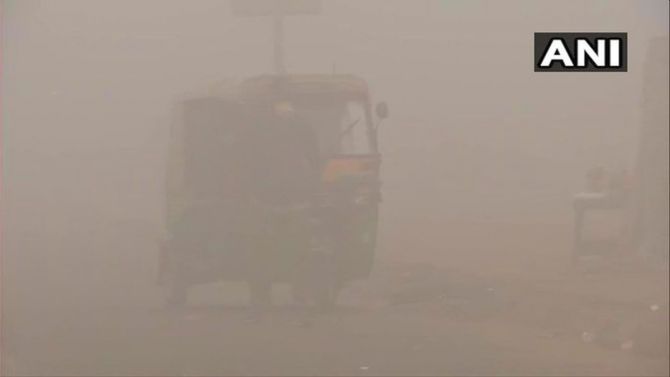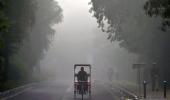A thick blanket of fog reduced visibility to zero metres in the national capital on Saturday, affecting traffic movement, the India Meteorological Department said.

This is the third time this season, after December 8 and January 1, that visibility has dropped to zero metres in the city.
'Very dense' fog lowered visibility to zero meters at Palam and Safdarjung. 'Dense' fog is predicted in parts of the city on Sunday as well, an IMD official said.
According to the IMD, 'very dense' fog is when visibility is between 0 and 50 metres. In case of 'dense' fog, visibility is between 51 and 200 metres, 'moderate' is between 201 and 500 metres, and 'shallow' is between 501 and 1,000 metres.
Delhi recorded a minimum temperature of 6.6 degrees Celsius, a notch below normal, on Saturday. The Lodhi Road weather station recorded a minimum temperature of 5.8 degrees Celsius.
On Friday, the Safdarjung Observatory, which provides representative data for the city, had recorded a low of 6.4 degrees Celsius. It was 2 degrees Celsius on Thursday and 3.2 degrees Celsius on Wednesday.
There was no improvement in the city's air quality which remained in the 'severe' category on Saturday.
The air quality index had entered the 'severe' category on Thursday due to "extremely unfavourable" conditions for the dispersion of pollutants, government agencies said.
The city's AQI was 436 at 9 am. The 24-hour average AQI was 460 on Friday, 429 on Thursday, 354 on Wednesday, 293 on Tuesday and 243 on Monday.
An AQI between zero and 50 is considered 'good', 51 and 100 'satisfactory', 101 and 200 'moderate', 201 and 300 'poor', 301 and 400 'very poor', and 401 and 500 'severe'.
Kuldeep Srivastava, the head of the IMD's regional forecasting centre, said the wind speed has slowed down and the moisture in the air has made the pollutants heavier.
The central government's Air Quality Early Warning System for Delhi said slow winds and ventilation conditions are "extremely unfavourable" for the dispersion of pollutants.
This will lead to further deterioration of the air quality, the agency said.











 © 2025
© 2025